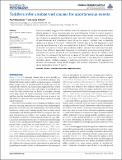Toddlers infer unobserved causes for spontaneous events
Author(s)
Muentener, Paul Jason; Schulz, Laura E.
DownloadMuentener-2014-Toddlers infer unobs.pdf (1.375Mb)
PUBLISHER_CC
Publisher with Creative Commons License
Creative Commons Attribution
Terms of use
Metadata
Show full item recordAbstract
Previous research suggests that children infer the presence of unobserved causes when objects appear to move spontaneously. Are such inferences limited to motion events or do children assume that unexplained physical events have causes more generally? Here we introduce an apparently spontaneous event and ask whether, even in the absence of spatiotemporal and co-variation cues linking the events, toddlers treat a plausible variable as a cause of the event. Toddlers (24 months) saw a toy that appeared to light up either spontaneously or after an experimenter’s action. Toddlers were also introduced to a button but were not shown any predictive relation between the button and the light. Across three different dependent measures of exploration, predictive looking (Study 1), prompted intervention (Study 2), and spontaneous exploration (Study 3), toddlers were more likely to represent the button as a cause of the light when the event appeared to occur spontaneously. In Study 4, we found that even in the absence of a plausible candidate cause, toddlers engaged in selective exploration when the light appeared to activate spontaneously. These results suggest that toddlers’ exploration is guided by the causal explanatory power of events.
Date issued
2014-12Department
Massachusetts Institute of Technology. Department of Brain and Cognitive SciencesJournal
Frontiers in Psychology
Publisher
Frontiers Research Foundation
Citation
Muentener, Paul, and Laura Schulz. “Toddlers Infer Unobserved Causes for Spontaneous Events.” Front. Psychol. 5 (December 23, 2014).
Version: Final published version
ISSN
1664-1078